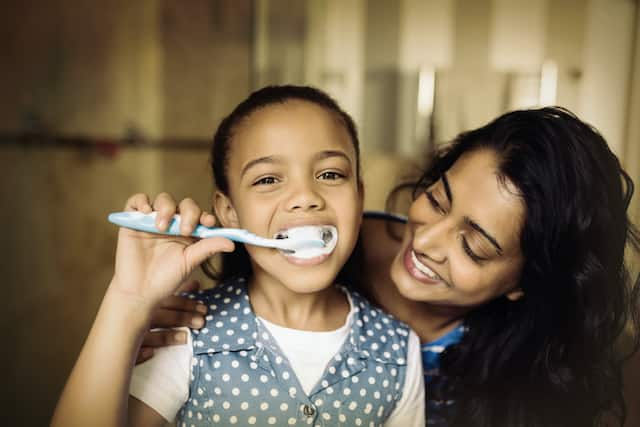Spotting the Signs of Gingivitis
The Indian Dental Association further explains that gingivitis is relatively easy to diagnose on your own, as the warning signs are very visibly evident. If you suffer from gingivitis, some of the warning signs are swelling, bleeding gums, bright red or purple appearance to gums, gums that are tender when touched, mouth sores, swollen gums and shiny appearance to gums.
Why Gingivitis Is Common in Childhood
When your children were toddlers, you may have let them brush and floss on their own and then finished the job for them if they missed any spots. But as any parent knows, children are less likely to accept the help of parents as they grow and assert their independence. Therefore, the oral health habits that prevent gingivitis should be instilled when a child's first teeth erupt. Although some kids are thorough enough in their efforts to remove plaque from their teeth and gums, others will skip flossing and only give their teeth a cursory pass with the toothbrush if they can get away with it. If your children are in the latter category, continue to supervise their oral hygiene routines until they've adopted good habits.
Gingivitis During Puberty
A research study in the International Journal of Science and Research (IJSR) discusses that the onset of puberty can bring about changes in the hormonal levels which in turn may affect the gingival tissues in both males and females leading to altered tissue response to dental plaque and can lead to conditioned gingival enlargement. Daily flossing is critical, and you may want to consider the use of special toothpastes, which helps to reduce plaque and gingivitis. Kids at this age may also need to undergo dental cleanings more frequently than every six months, so consult your dental professional for their recommendation.
Severe gingivitis is just one step away from a chronic condition that requires frequent and costly dental procedures. Help your children prevent gingivitis by teaching them proper brushing and flossing habits early on and taking them for regular dental check-ups and cleanings. Also encourage them to assume responsibility for their oral health by detecting and reporting symptoms at the earliest stages when they can be treated conservatively. Taking ownership of their oral and overall health now is a habit that will serve your children for life.
This article is intended to promote understanding of and knowledge about general oral health topics. It is not intended to be a substitute for professional advice, diagnosis or treatment. Always seek the advice of your dentist or other qualified healthcare provider with any questions you may have regarding a medical condition or treatment.
ORAL HEALTH QUIZ
What's behind your smile?
Take our Oral Health assessment to get the most from your oral care routine
ORAL HEALTH QUIZ
What's behind your smile?
Take our Oral Health assessment to get the most from your oral care routine













